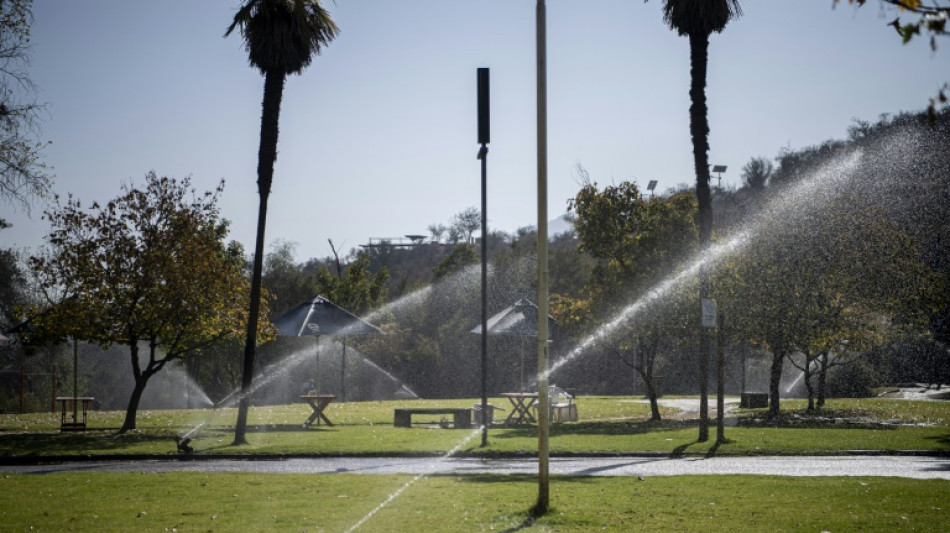
-
 Djokovic advances at US Open as Sabalenka, Alcaraz step up title bids
Djokovic advances at US Open as Sabalenka, Alcaraz step up title bids
-
Venice Film Festival opens with star power, and Gaza protesters

-
 Globetrotting German director Herzog honoured at Venice festival
Globetrotting German director Herzog honoured at Venice festival
-
Djokovic fights off qualifier to make US Open third round

-
 Duplantis, Olyslagers seal Diamond League final wins
Duplantis, Olyslagers seal Diamond League final wins
-
Israel demands UN-backed monitor retract Gaza famine report
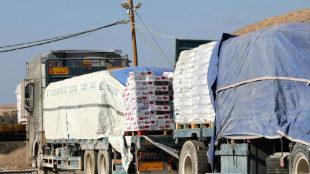
-
 Vingegaard reclaims lead as UAE win Vuelta time trial
Vingegaard reclaims lead as UAE win Vuelta time trial
-
Shooter kills 2 children in Minneapolis church, 17 people injured

-
 Defence giant Rheinmetall opens mega-plant as Europe rearms
Defence giant Rheinmetall opens mega-plant as Europe rearms
-
Van Gogh Museum 'could close' without more help from Dutch govt

-
 Indonesia's Tjen exits US Open as Raducanu moves on
Indonesia's Tjen exits US Open as Raducanu moves on
-
Trump administration takes control of Washington rail hub

-
 Stock markets waver ahead of Nvidia earnings
Stock markets waver ahead of Nvidia earnings
-
Conservationists call for more data to help protect pangolins

-
 US Ryder Cup captain Bradley won't have playing role
US Ryder Cup captain Bradley won't have playing role
-
French star chef to 'step back' after domestic abuse complaint

-
 Rudiger returns, Sane dropped for Germany World Cup qualifiers
Rudiger returns, Sane dropped for Germany World Cup qualifiers
-
S.Africa calls US welcome for white Afrikaners 'apartheid 2.0'

-
 'Resident Evil' makers marvel at 'miracle' longevity
'Resident Evil' makers marvel at 'miracle' longevity
-
Denmark apologises for Greenland forced contraception

-
 Hungary web users lap up footage of PM Orban's family estate
Hungary web users lap up footage of PM Orban's family estate
-
Alexander Isak selected by Sweden despite Newcastle standoff

-
 Italy's Sorrentino embraces doubt in euthanasia film at Venice
Italy's Sorrentino embraces doubt in euthanasia film at Venice
-
Trump urges criminal charges against George Soros, son

-
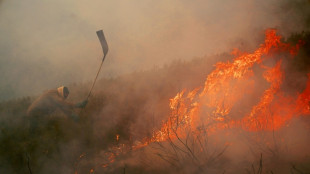 Wildfires pile pressure on Spanish PM
Wildfires pile pressure on Spanish PM
-
Stock markets mixed ahead of Nvidia earnings

-
 Football's loss as hurdles sensation Tinch eyes Tokyo worlds
Football's loss as hurdles sensation Tinch eyes Tokyo worlds
-
Pakistan blows up dam embankment as it braces for flood surge
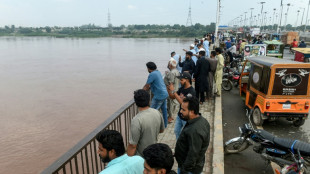
-
 Lego posts record sales, sees market share growing further: CEO
Lego posts record sales, sees market share growing further: CEO
-
France overlook Ekitike for World Cup qualifiers, Akliouche called up

-
 Rain no obstacle, Lyles insists ahead of Diamond League finals
Rain no obstacle, Lyles insists ahead of Diamond League finals
-
Almodovar urges Spain cut ties with Israel over Gaza

-
 Macron gives 'full support' to embattled PM as crisis looms in France
Macron gives 'full support' to embattled PM as crisis looms in France
-
Stock markets diverge awaiting Nvidia earnings

-
 German cabinet agrees steps to boost army recruitment
German cabinet agrees steps to boost army recruitment
-
Denmark summons US diplomat over Greenland 'interference'

-
 German factory outfitters warn of 'crisis' from US tariffs
German factory outfitters warn of 'crisis' from US tariffs
-
Israel ups pressure on Gaza City as Trump eyes post-war plan

-
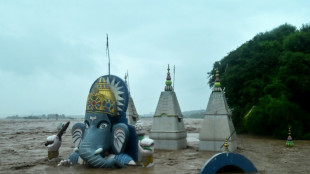 Floods, landslides kill at least 30 in India's Jammu region
Floods, landslides kill at least 30 in India's Jammu region
-
Former player comes out as bisexual in Australian Rules first

-
 Indian spin great Ashwin calls time on IPL career
Indian spin great Ashwin calls time on IPL career
-
India faces world football ban for second time in three years
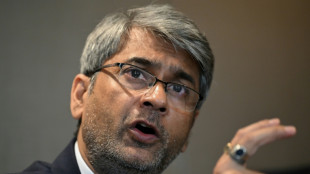
-
 Globetrotter Herzog to get special Venice award
Globetrotter Herzog to get special Venice award
-
'Old things work': Argentines giving new life to e-waste

-
 Showtime for Venice Film Festival, with monsters, aliens, Clooney and Roberts
Showtime for Venice Film Festival, with monsters, aliens, Clooney and Roberts
-
Thai woman jailed for 43 years for lese-majeste freed

-
 What is swatting? Shooting hoaxes target campuses across US
What is swatting? Shooting hoaxes target campuses across US
-
Row over Bosnia's Jewish treasure raising funds for Gaza

-
 Police search Australian bush for gunman after two officers killed
Police search Australian bush for gunman after two officers killed
-
NZ rugby player who suffered multiple concussions dies aged 39


Under shadow of drought, Santiago ditches exotic plants
With drought casting a constant shadow over Santiago's 7.1 million residents, there has been a recent rush to replace thirsty, exotic plants with hardier, native ones in the hopes of staving off water rationing.
One of Latin America's most urbanized cities has experienced more than a decade of drought, and managing water access for its fast-growing population is becoming increasingly difficult.
Last year saw the driest winter -- the rainy season in Chile -- this century, with 71 percent lower rainfall for Santiago than usual, according to the national meteorological office.
Predictions are equally dire for the southern-hemisphere winter about to start with the Mapocho River at 57 percent of capacity, the Maipo River at 61 percent and the El Yeso reservoir at just over two-thirds full.
City authorities are bracing for tough times ahead.
"We can’t make it rain. That is out of our hands, but we can prepare for... an extreme situation," said Claudio Orrego, governor of Santiago.
Last week, the municipal government announced a four-step crisis plan that starts with encouraging voluntary water conservation but could end in a "Red Alert" phase of rationing.
If the water runs out, cuts will be rolled out to one sector of the city at a time, for a maximum of 24 hours each, under the plan.
It could affect some 142,000 households supplied by the Mapocho River, which bypasses Santiago from east to west, and another 1.5 million that rely on the Maipo River to the south.
- 100,000 trees -
Every day, agricultural engineer Pablo Lacalle -- head of water resources at the Santiago Metropolitan Park (Parquemet) -- guages the level of the Mapocho River.
Last year, the water level fell by more than half, according to official data.
"We have to plan... to know how much irrigation capacity we will have," Lacalle told AFP with a concerned look.
"We have a deficit of about 87 percent of water in the park compared to previous years... Fifteen years ago the park had enough water to irrigate everything."
Faced with the new reality, the park is rolling out a drought-busting re-planting plan.
"We have replaced exotic forest with native forest," with 100,000 trees replanted in three years on the park's northern slope, Parquemet director Eduardo Villalobos said.
Last year, pasture in the park was reduced by 50,000 square meters and replaced with endemic plants.
- Every drop 'precious' -
In the city itself, some are starting to take aim at green grass.
Urban architect Joaquin Cerda in 2021 launched a movement against "European-style" grass-lined sidewalks.
His project, "Vereda Nativa" (Native Sidewalk), has so far replaced some 150 square meters (1,600 square feet) of grass in the neighborhood of Pedro de Valdivia Norte with 25 native plant species.
These were more adept, he said, to the climate of Santiago, "to prolonged drought and to live a long time without water," he told AFP.
Now, "we water here once a week for half-an-hour using drip irrigation," said Cerda, reducing water consumption to less than a tenth of what it was before.
"Every drop of water is very precious."
According to the World Bank, annual precipitation in Chile's coastal regions has decreased by 15 to 30 percent in the last century, leading to multiple periods of severe drought.
Climate change would likely change the frequency and magnitude of hazards such as wildfires and droughts, with risks for economic growth and public health, it says.
Access to water has become an increasingly contentious point in Chile.
Legally, water is a resource for public use, but the government has granted almost all exploitation rights to the private sector.
Industry accounts for about 20 percent of consumption and agriculture another 70 percent, with avocado -- a major Chilean export -- a particularly thirsty crop.
This all posed little problem in times of abundance, but drought brought a furious reaction in 2020 when some communities started running out of water.
Protesters occupied a well managed by a copper mining company, demanding it be used to provide water to communities instead.
The Constitutional Convention drafting a proposed new founding law for Chile on Monday approved an article stating that water is an "inalienable public good."
N.Fournier--BTB

